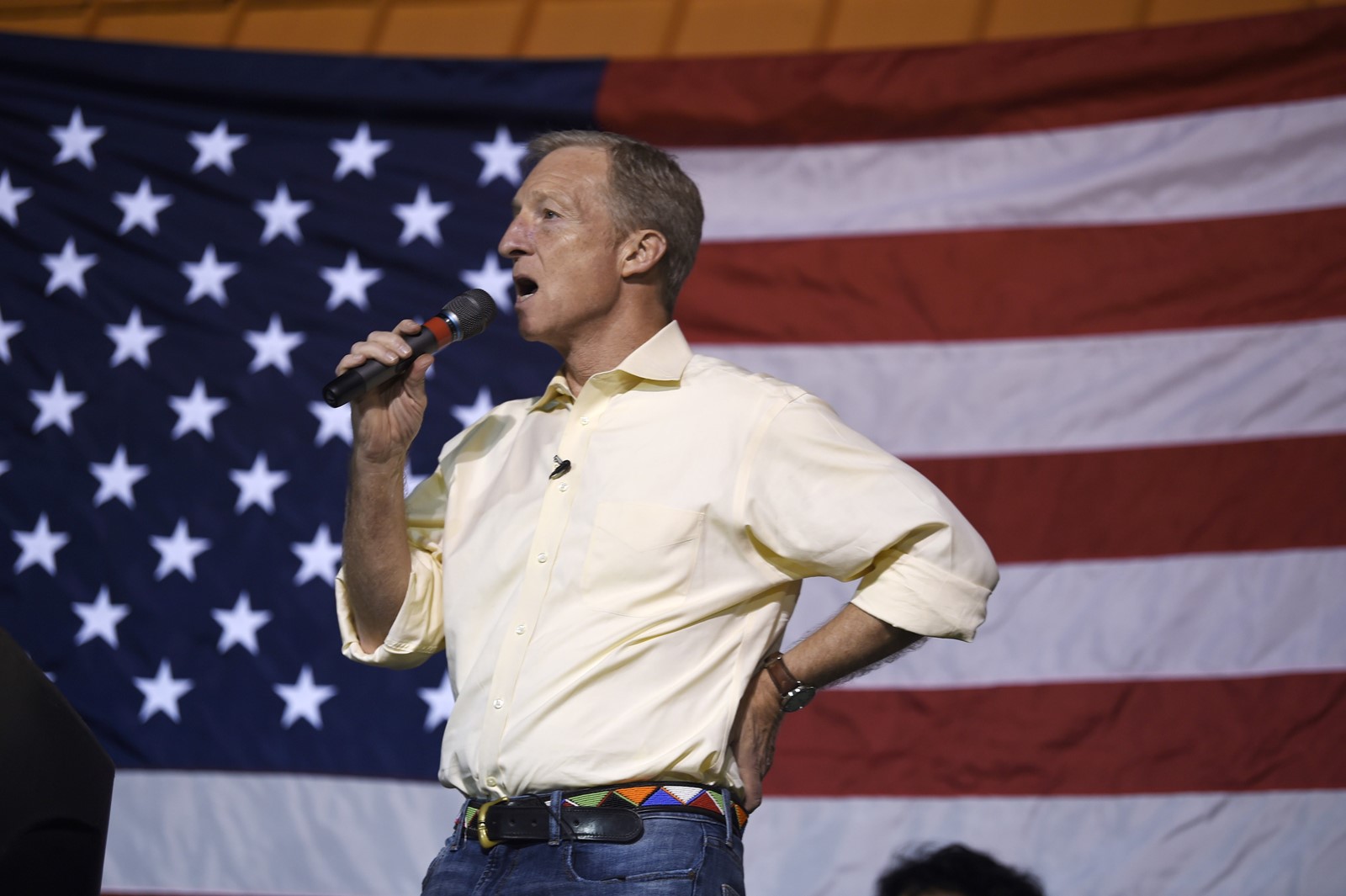Seeing clean energy as ‘huge job creator’
Tom Steyer says it’s
‘a fake argument’ that growth must entail pollution. He shares ideas for a recovery.

We’ve always known that moving to a green and sustainable economy is a huge job producer. In California, it has already been a huge job producer.
I can’t talk specifically about what the task force is going to come up with, because we haven’t even met yet. But I think across the United States of America, the country is going to do a huge rebuilding program, and those are investments that will be in place for a long time. So it’s important to be looking out a long way when you make 40-year investments.
This task force is looking to produce a more just, green and forward-looking California. And exactly how that works out is TBD. But it’s clear that the United States as a whole is going to do a huge rebuilding, and we have to do it with an eye to the future.
You have to break it down into time periods. When you’re talking about rebuilding the country, you’re talking a very long time period, but there are also things that are going on in the very short term. And obviously there’s something extreme going on in the oil and gas business around the world. That’s hitting American workers very hard.
There are short-term concerns, and then there’s long term. You’re going to have to be dealing with both of those concerns in real time. So to me the real question is much more about long term: How are we going to make sure that we’re moving to a green and sustainable place? And at the same time we’ve got the short-term needs of working people who are getting hurt, and trying to figure out how to make sure that they will be taken care of.
There is going to be a need, as we’ve always known, to rebuild America. And that’s been something that has been on hold, it seems to me, for several decades. There’s a lot of overdue work. And so the choice of what we build is really, really important.
Does that have to do with transportation? It definitely does, over time. Does it have to do with building codes? Of course it has to do with building codes, and it has to do with energy generation. There’s a pent-up need to put a lot of people to work rebuilding this country on an expedited basis. And California is way ahead on a lot of this stuff. We have been real leaders in building codes since the 1970s. We are real leaders in terms of electric vehicles, numbers on the road, also the leading electric vehicle company is a California company. And we’re leaders in terms of the rules we’ve put in place for clean energy generation, and not just the rules, but what we’ve accomplished.
So I think as a nation, we’re going to have to move toward the kinds of things California has been doing for a long time.
I don’t want to prejudge where we come out as a task force. And in any case it’s going to be the governor who ultimately decides what we actually put into effect.
We’ve already got very ambitious goals in terms of when we’re going to be carbon-neutral, 2045. But is there going to be a lot going on that will lead to a more sustainable California sooner? I certainly hope so. And that’s something we’re going to be spending a lot of time thinking about the specifics of.
And it may be in places we haven’t traditionally talked about. People have tended to focus on transportation, energy generation and building codes. But there’s a whole host of other industries and other greenhouse gas generating places where we can look and see whether there are opportunities to make real strides. I am very hopeful that we can lead the whole country and be innovative and forward-thinking, the way California traditionally has been.
There’s greenhouse gas generation through manufacturing, through agriculture — really in all the rest of the economy. And those are things where the opportunity for innovation exists, and we have to look and see what’s possible.
When you think about what a Green New Deal is, it really is about rebuilding America in a sustainable way, and sustainability in a very broad sense, which implies a lot of the things that this task force has said it will do — which is equity, a fair America that is addressing some of the inequities and injustices that COVID has made more apparent.
We’re in a real crisis, and we’re trying to come up with specific, practical things we can do. But they’re going to be in the context of fair, just and forward-looking, and those are the tenets that the Green New Deal represents.
I’ve never bought the argument that we need to be polluters in order to grow. I’ve always felt strongly that was a fake argument made by people who wanted to be unjust and to pollute.
We’ve seen in California that building a sustainable economy actually creates a lot of jobs. The most recent number I saw was over 500,000 jobs in California in clean energy. I think what we’re going to see is that providing a more just America, providing a more sustainable, green America, is actually going to be a huge job creator.
Rebuilding America in a green way creates construction jobs, and jobs for a lot of people in the trade unions. And when we talk about making sure that people are taken care of from a health standpoint, those are real jobs, and they need to be fairly paid.
The idea that green and employed are in conflict has never been true in my mind. How are we going to have a well-employed, healthy country if we’re destroying the environment and treating people unfairly?


